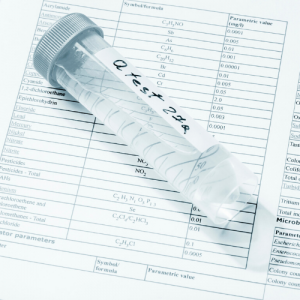 With the start of a new year, ISTC’s Institutional Water Treatment (IWT) program is offering a new service to test water sources for Legionella, the bacterium that causes Legionnaires’ disease, to decrease exposure for clients with weak immune systems.
With the start of a new year, ISTC’s Institutional Water Treatment (IWT) program is offering a new service to test water sources for Legionella, the bacterium that causes Legionnaires’ disease, to decrease exposure for clients with weak immune systems.
Legionnaires’ disease is caused by inhaling water mist containing Legionella. The bacterium can grow in showerheads and sink faucets, cooling towers, and large plumbing systems. Legionella is inhaled, most commonly when showering, according to Mike Springman, manager of the IWT program.
“As long as the temperature of the stored water is hot enough, at 140 degrees, and is hot enough when used, at 120 degrees, and the chlorine is adequate, there shouldn’t be a problem,” Springman said. “Older systems and systems that are not well maintained are more at risk.”
Vulnerable populations, including older adults and others with compromised immune systems, are more susceptible to exposure. Legionnaires’ is a serious type of pneumonia, and symptoms include fever, cough, chills, and muscle aches.
The IWT services group gives advice on controlling corrosion, mineral scale formation, and biological growth for facilities with institutional water systems. Most of their clients are state-operated facilities, such as Human Services, Department of Corrections, the Department of Veterans Affairs, and others that often have older facilities that need to be checked periodically and maintained.
Using IDEXX laboratory test kits, IWT field chemists place bottled water samples in sealed trays, minimizing their own exposure to the bacterium. New laboratory testing facilities at the University of Illinois have been equipped specifically to handle water samples to be tested for Legionella.
Previously, Springman received requests from large facilities a few times a year to test for this particular bacterium. Until now, the testing was not cost-effective because it required sending samples to an outside lab.
“I think that Legionnaires’ disease is becoming more prevalent, or at least people are becoming more aware of what it is as time goes on,” Springman said. “The feedback to our announcement of this new service has been positive, and I think it’s going to work well. It’s going to serve our clients, which is what we’re here to do.”
For more information about IWT and to schedule a site visit, view https://www.istc.illinois.edu/techassist/iwt.

